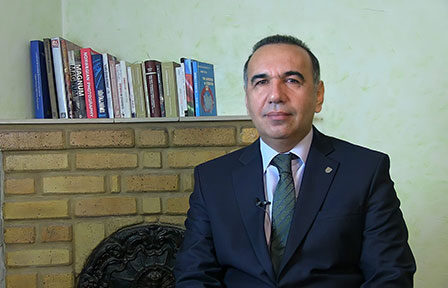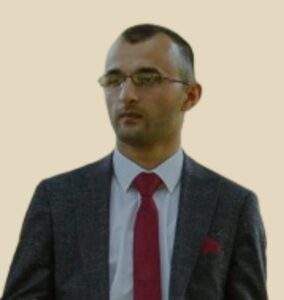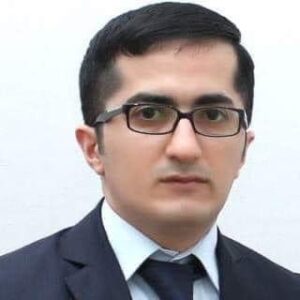Chairman: Mammad Talibli

He was born in 1973. He has been working at Azerbaijan State University of Economics (UNEC) since 2002. He has been working in the civil society sector since 2002. In 2004-2005, he worked as an expert in the monitoring group of the Baku-Tbilisi-Ceyhan oil pipeline and the Audit group of the South Caucasus Gas Pipeline. He was represented in several coalitions and working groups. He worked as an expert and coordinator in dozens of local and international socio-economic projects. He participated in various meetings and trainings related to budget policy in the US State Department, State Treasury, Congressional Budget Office, New America Foundation. He gave lectures on various topics of economy in many universities (UNEC, ASCC, LSU, AU, BEU, Anadolu University). A large number of scientific works have been published abroad and in the country. In 2006, he was awarded a place in the “Teachers who don’t take bribes” competition held by the “Dalga” movement for higher schools. In 2018, he participated in the teacher exchange program at Anadolu University of Turkey within the ERASMUS program and gave lectures on “Energy Policy”. He is one of the co-authors of a textbook (“Business organization and management”, 2008). He is also the author of three books (“Human value in economics”, “Science-book-teacher triangle”, “Economic vector and strategic choice”). A large number of scientific articles and theses of the author have been published in the country and abroad. He participated in events related to various economic topics in several countries (USA, Turkey, Georgia and others). Since 2012, the Institute for Economic Analysis has taken a serious initiative for the creation of the Public Union and its state registration for many years. The institute was registered with the state in 2022 based on the decision of the European Court of Human Rights, after passing the local court instances. He is the co-founder and chairman of the Institute for Economic Analysis.
Vice chairman: Hasan Rahimli

He was born in Lankaran in 1993. He graduated from UNEC with honors and is currently pursuing a doctoral degree in economics at LSU. He has received additional education in political economy, philosophy, and psychology at local and foreign universities. He holds an international certificate in behavioral economics (Istanbul University) and economic (political) philosophy (Harvard (online) University). He has worked as a lecturer at several universities (Lankaran State University, Khazar University, Academy of the State Customs Committee, Azerbaijan University, Western University, UNEC). His main scientific interests include political economy, behavioral economics (economic psychology), institutional economics, political, philosophical, and ethical (moral) problems of international economics. He was an expert on “economic analysis and anti-corruption” at the Small and Medium Business Development Center (SMED) of the Ministry of Economy. He currently works as a scientific researcher at several universities and at the ESRI of the Ministry of Economy. Since 2017, he has worked as a professional trainer on economic, philosophical and psychological topics in various government and non-governmental organizations. He has completed international advanced training courses on political economy (Leiden University), political philosophy (Yale University), behavioral finance (Yale University), neuroeconomics (National Research University “Higher School of Economics”), macroeconomic analysis (IMF), universities and higher education policy (ADB Institute), anti-money laundering (AR MMX), anti-corruption (UNMCI), poverty and inequality (UN SDG Academy), combating human trafficking (Polaris Project), social psychology (Logos PNIM), business ethics and moral philosophy (University of Geneva), mainly in a distance format. He has been an expert on various projects of the Ministry of Science and Education, the Ministry of Economy, the State Customs Committee, the Ministry of Youth and Sports, the Youth Fund of the Republic of Azerbaijan, the State Employment Agency and the Youth Development and Career Centers. He has given scientific presentations at more than a hundred scientific seminars and conferences. He is the author of more than 20 scientific articles and theses published in local and international scientific journals. He is a member of the World Bank’s working group on Azerbaijan. He is also a researcher and deputy chairman of the Institute for Economic Analysis, an economic and political think tank.
Nijat Gasim

Nijat Gasim was born in 1988 in Kalbajar district. In 2006, he was admitted to the Economic-Cybernetics of the Faculty of Applied Mathematics and Cybernetics of Baku State University. After completing his bachelor’s degree in 2010, he was admitted to the Master’s degree in Econometrics at the Institute of Social Sciences of the Dokuz Eylül University of the Republic of Turkey. After graduating in 2013 with his research work in the field of Bayesian Econometrics, he worked in various research works on Linear and Non-linear time series analysis in 2013-2016. Since 2016, he has received a Ph.D. degree in economics for his research on time-varying parameter models at the doctoral level of Dogguz Eylül University. Over the years, the author has presented econometric research reports at more than ten international scientific symposium. He has an article published in international scientific journals. At the same time, he is engaged in the translation of books written on econometric studies into Turkish and Azerbaijani languages. He is the translator of the book “Dynamic Analysis of Economic and Legal Variables”, published in Turkey in 2014, authored by Valery Turukhov and Farhad Rahmanov. He took part in the translation team of the book “A Introdoctory to Econometrics, A modern Approach” written by Wooldridge into Azerbaijani, translated the book “Applied Econometrics” written by Dimitrios Asteriou and Stephan Hall into Azerbaijani. In addition to his scientific research at the university, he conducts trainings on Biostatistics and Econometric studies to various private and public hospitals and companies on the basis of a service contract. In his research, he uses programs such as EViews, Stata, Minitab, SPSS, Gauss, Oxmetrics, NCSS, Gretl, R and Python extensively. He is married and has a child.
